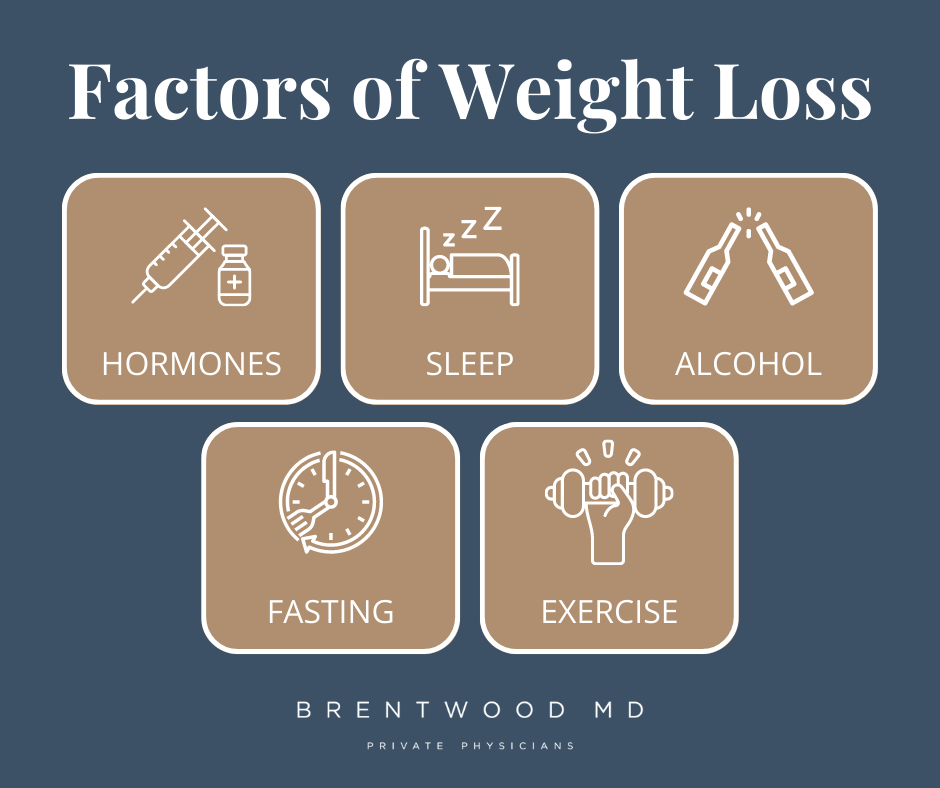Download file | Play in new window | |
Of all the conversations that happen in our practice, weight loss is one of the most frequent. Our members are never short on questions, concerns, frustration, and confusion, and I’m here for them.
Diet and fitness have achieved an almost cult-like status in our society, underpinned by onerous rules and regulations leading the journey toward transcendence (e.g., the beach body).
My goal has been to strip away the “religion” of diet and weight loss and focus on what the science says. And science points to hormones as the key player in the epidemic of excess weight. What this means is that the standard advice of “eat less, exercise more” loses steam as the holy grail of weight loss.
As the science of weight loss has evolved, so too has our conviction about the most important factors that facilitate weight loss. Here, we’re taking an up-to-date look at these top weight-loss factors and sharing some insights gained from personal experience.
The Obesity Epidemic: A Modern-Day Problem Rooted in Faulty Thinking
Obesity is very much rooted in the 20th century. Prior to 1900, only about 5% of the U.S. population was overweight. Extra heft was actually something of a status symbol, the domain of people who could afford an abundance of food. Today, more than 50% of U.S. adults are obese or severely obese, with many more falling into the overweight category.
The advent of mass agriculture in the 1950s accelerated the epidemic. As the population became heavier, health and nutrition professionals began preaching from the pulpit of calories. People were told that if they reduced calories and moved more, they would lose weight.
It was a great way to sell low-calorie boxed carbohydrates while fueling the increase in obesity and metabolic disease.
Weight loss is more than a math problem because not all calories are created equal. If you want to break free from the shackles of weight loss struggles, you need to optimize your hormones — namely insulin. Insulin fuels fat cells to grow.
The hallmark advice for weight loss has long been “eat less, exercise more.” This is what you’ll typically hear from traditional primary care practices. And to be clear, people who need to lose a significant amount of weight will need to do this. But we now understand that excess weight is a biochemical issue centered around insulin and blood sugar.
Obesity is a metabolic disease, fanning the flames of diabetes, heart disease, and cancer.
A “Faster” Way to Lose Weight
We’re not saying what you eat doesn’t matter. It’s just that the conventional “wisdom” of weight-loss religion places far too much emphasis on it.
Of course, your food choices will be important when you’re trying to lose weight and optimize your health. But regardless of your specific diet, what you eat matters less than when you eat.
For this reason, we’re huge proponents of intermittent fasting. Science is telling us that the total time spent NOT eating in a day may be the single most powerful element of the weight-loss journey.
Intermittent fasting means getting out of your body’s way for 12 hours or more by not feeding it new calories. This often means eating your first meal several hours after you wake up and consuming your last calories at least two hours before you go to sleep. For many, the reduction or elimination of late-evening meals and nighttime snacking makes a big difference.
Some can only tolerate a 12-hour window of fasting, but many successfully maintain a 14- or 16-hour fast each day. What matters is finding what works for you.
Beyond Fasting: The Pitfalls of Sleep and Alcohol
Two of the most underrated influences on weight loss are sleep and alcohol. Each has its own detrimental effects, but together they can create powerful negative momentum.
Snooze to Lose
Sleep is a big red X on the map that says “dig here” if you struggle with weight loss.
The ramifications of skimping on quality shut-eye are massive. This includes difficulty shedding excess pounds. Significant bodily recovery occurs during sleep, including the mobilization and breakdown of fat. So if you aren’t making sleep a priority, you could be inadvertently sabotaging your waistline.
High performers, especially, can struggle with this. In fact, many of our members tell us they don’t get enough sleep — and we see it in their blood work. Insulin resistance, elevated hemoglobin A1C, high triglycerides, and more all show up and point to a constant stress response in the body.
I recall a study I once read on first-year surgical residents. These were young people doing a 30-day rotation in a high-stress, minimal sleep scenario. Researchers checked their blood work at the beginning and end of the study. The results showed that just 30 days of sleep deprivation had precipitated insulin resistance and set these otherwise healthy interns on their way to metabolic disease.
If 30 days has this effect, how about 30 years? You simply can’t sleep on sleep.
One crucial way to prioritize the restorative rest your body needs is to optimize your bedtime habits. For instance, eating within two hours of hitting the hay interferes with deep sleep — another great argument for intermittent fasting.
And, of course, alcohol absolutely destroys your sleep quality, so it’s best to avoid that nightcap before bed. (Surprised? Read on.)
Think Before You Drink
Alcohol gets some weight-loss-related attention as a source of “empty calories,” but this is perhaps its most minor offense.
The real problem is that alcohol is, in fact, a toxin, and that toxin must be processed by your liver — the epicenter of your metabolic engine. But with alcohol on board, all that metabolic machinery shuts down, diverting attention to eliminating a toxic substance. You need your liver to run at peak performance if you want to lose weight.
On top of that, alcohol interferes with sleep. A lot. Yes, it can relax you and help you fall asleep, but falling asleep and staying asleep are two very different biological processes. One to three hours after you drift off, alcohol absolutely devastates your deep sleep. (Wearables are a fantastic way to get eyes on this!)
And then there’s the delivery system. By itself or combined with sugary mixers, alcohol often delivers a major glucose infusion — along with uncontrolled snacking brought on by lower inhibitions.
If you’re aiming to optimize your weight journey and you consume alcohol on a regular basis, this area deserves an audit.
Move It and Lose It
Traditionally, when most people start talking about weight loss, their first thought is exercise. The notion has been drilled into our collective consciousness.
If weight loss were purely a math problem, this might make sense: burn more calories! But since achieving and maintaining a healthy weight are much more than that, we need another approach.
I’m not saying exercise isn’t important — it is. A thoughtful fitness plan is critical. But when it comes to weight loss, it’s likely the least important of the important things.
Three or four hours per week of vigorous exercise is not enough to undo an unfocused diet. You can’t outrun your mouth.
Instead, exercise can act as a multiplier for someone already progressing on a weight-loss journey. For someone who has already fixed the way they feed themselves, who’s getting adequate sleep and avoiding toxins, working out is a fantastic weight-loss multiplier.
This ties back to the three pillars of health: how you feed your body, how you move your body, and how you recover your body. Exercise is a great maintenance technique once you’ve reached your goal weight, but it’s rarely enough on its own to lose significant body fat.
If you’re ready to incorporate a fitness regimen into your healthy lifestyle, take a look at our tips in this blog post.

A 25-Year Transformation
I’ve had the pleasure of watching Jen’s weight-loss journey over the years. She had fallen prey to the standard advice of “eat less, exercise more” and wasn’t seeing satisfactory results.
Jen has always been a champion sleeper, so she had that piece covered. And she doesn’t drink much alcohol. For her, it was about fixing her relationship with food and thinking of weight loss as more than a math problem.
Now, rather than trying to “undo” bad eating with exercise, Jen has adopted a fasted lifestyle, which includes not eating close to bedtime. After figuring out the food part, she added exercise as a weight-loss multiplier. Her trainer helps her push herself within the parameters that make sense for her life and limitations. The result? Jen has lost 50 pounds in the last 18 months.
While Jen wasn’t always motivated to exercise, she was consistent about it. And really, it’s not motivation that gets you there; it’s discipline and commitment. In fact, she’s found that motivation follows action, not the other way around.
If you want to build consistency in your life around physical activity, consider things you like to do that can keep you active. For some, it’s the gym. For others, it’s brisk walking, running, or swimming. Find a rhythm that’s manageable for you, and enjoy the freedom of discipline.
Enjoy the Journey
Life is about the journey, not the destination. This is especially true when it comes to your health — because you’re never done. Caring about your health never ends; it’s an infinite game.
If you’re struggling with weight loss, remember, it’s not a math problem — it’s a hormone problem. Zero in on intermittent fasting, sleep, and alcohol consumption, and take offensive action to attack insulin resistance.
If you see anyone in life who’s enjoying the rewards of hard work, remember, motivation isn’t what got them there. It’s the discipline and commitment to doing the hard things every day when no one is looking.
And it gets easier later because you enjoy the compounding momentum as you go.

Dr. Aaron Wenzel is a concierge physician specializing in the care of fast-moving entrepreneurs, executives, and public figures in the Nashville, TN area. Dr. Wenzel’s diverse life experience and extensive training in family medicine, emergency care, nutrition, and hormone replacement therapies give him the unique platform to provide unmatched care for his patients.







